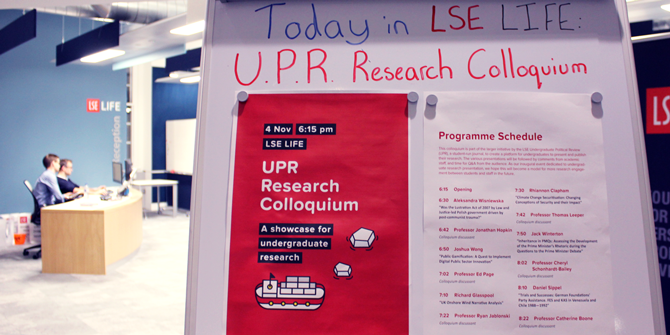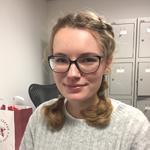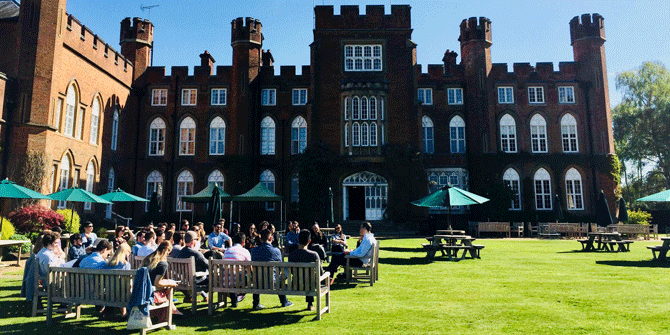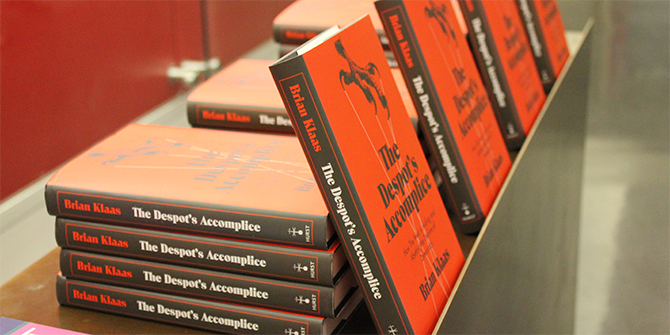Hannah Bailey, who is studying a BSc Politics and Philosophy in the Department of Government and is Event Manager for the LSE Undergraduate Political Review (UPR), reflects on the first UPR Colloquium which took place on Friday 4 November.
On a rainy Friday night of Reading Week, around 50-55 students attended the first ever “UPR Dissertation Colloquium” in the LSE LIFE Centre. So what, you might ask? Why was this a big deal? It was a path-breaking event because it is the first time that LSE Government and International Relations students presented their third year dissertations in a formal academic setting, complete with academic staff as discussants for each dissertation. In total six BSc graduates from 2015-16 presented their dissertations before a large audience (certainly by the standards of a typical academic conference, we are told!).
But, the event did not materialise out of thin air, nor was it without a few hiccups. Six months ago, none of us even knew what a “colloquium” was (we now know that it is a small specialist academic conference). Nonetheless, after much preparation, and despite fighting UK border control and LSE’s audio systems, the Undergraduate Political Review’s (UPR) Colloquium was a phenomenal success. Our aim had always been to showcase stellar undergraduate research and bridge the gap between academic staff and students. Hopefully, thanks to a great turnout of students and faculty staff, we have made steps towards bettering integration and inspired the next generation of undergraduate researchers.
How it all began:
The UPR Colloquium was originally the brainchild of former UPR editor Jack Winterton (who can now be found working in the new LSE Life Centre). However, bringing his idea of an undergraduate research conference to life was no easy feat. The UPR team spent several months navigating the bureaucracy of the LSE and our own Government Department (there is a remarkably complex process to arrange refreshments). One of our presenters who was flying in from outside the country also had some difficult encounters with the UK border control (who refused him entry—twice). He persevered and pre-recorded his presentation, which then created some challenges for LSE’s Audio Visual team. But it worked (mostly) and the evening was well received by all.
The event:
We were fortunate enough to have six student presenters whose research covered a broad spectrum of areas, ranging from “German democratic institutions and their influence in emerging democracies” to “climate change as a global security threat”. There was something for everyone, and many students who attend spoke of how the UPR has inspired them to take their research further (or even begin research projects!).
Unfortunately, there were several technical hiccups throughout the evening, including a very high pitched screeching sound coming from the brand new high-tech speaker system and the aforementioned video from our friend from somewhere outside the UK border control. However, these minor hiccups were not enough to deter our speakers, and UPR marched on.
We were also extremely lucky to have so many members of academic staff volunteer to be discussants for the presenters’ papers. Each presenter had his or her own discussant who evaluated the dissertation, suggesting ways in which it could be improved and how the presenter could expand his or her research in this field. The responses were mixed in their approach, but all equally valuable and provided our undergraduates with rare in-depth analysis of their work. Many attendees commented on the friendly yet academic atmosphere, with faculty and students alike enjoying the opportunity to discuss political research outside the classroom.
Reflection:
All-in-all, the first annual UPR colloquium exceeded our expectations. On behalf of the UPR (and I’m sure the Government Department), we would like to thank everyone involved–UPR staff, Government academics, and everyone who showed up to support us. In particular we would like to thank Professor Schonhardt-Bailey and Emma Rees for helping on the organisation to make this event possible.
We would also like to thank Jack Winterton, Joshua Wong, Aleksandra Wisniewska, Richard Glasspool, Rhiannon Clapton and Daniel Sippel for giving up their time to present their research, and our academic discussants: Professors Leeper, Boone, Jablonski, Hopkins, Schonhardt-Bailey, and Gjoksi.
We hope that the UPR colloquium was the first step in bridging the research gap between staff and students, and provided a platform for undergraduates to present their research in a public forum. We also hope this will become a model for more research engagement between students and LSE academic staff in the future.
With your help UPR can become an established part of student/academic life at the LSE, as it profiles the excellent research that we, as undergraduates, can produce. We hope to see you again next year, and maybe by 2017, it will have graduated from the “small specialist” colloquium into a full-fledged academic research conference. Or maybe we will just keep it the “UPR Dissertation Colloquium”—after all, why quibble with success?
Hannah Bailey is studying a BSc Politics and Philosophy in the Department of Government and is also Event Manager of the LSE Undergraduate Political Review (UPR).
LSE UPR offers undergraduates the opportunity to publish research in a peer reviewed journal, and get involved in contemporary political debates by disseminating their work online.
Follow the LSE Undergraduate Political Review on Twitter – @lseupr
Note: this article gives the views of the author, and not the position of the LSE Department of Government, nor of the London School of Economics.







